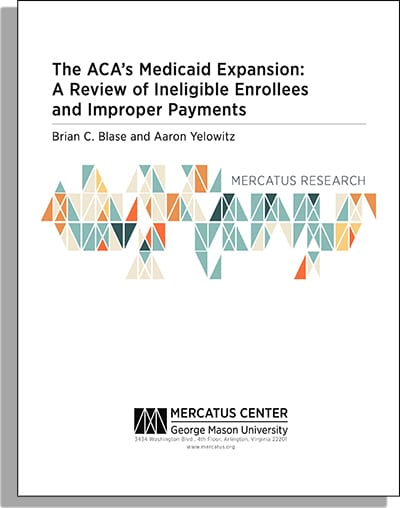Enrollment in Medicaid has been much higher than expected in expansion states, significant errors and problems permeate state eligibility determinations, and many enrollees are ineligible, Blase and Yelowitz explain in a detailed analysis of the ACA’s Medicaid expansion.
States are responsible for monitoring who enrolls in Medicaid, but the federal government foots most of the bill so states have little, if any, incentive to spend wisely or to strictly follow enrollment guidelines, the authors write in their new paper for Mercatus.
They detail how the program has expanded dramatically from its core focus on individuals with disabilities, lower-income seniors, pregnant women, and lower-income children. The ACA made a new category of working-age, single adults eligible for Medicaid, but states are not properly screening for eligibility, and federal oversight had been lax.
They describe Medicaid already-perverse incentives that were exacerbated by the ACA, why expansion enrollment is much higher than CBO expected, and the findings of government audits showing severe problems with eligibility certification. In Colorado, for example, “contrary to the provisions of its own verification plan, [the state] relied on self-attestations rather than income verifications.”
The paper takes a deep dive into the literature and the audits conducted so far, with state-by-state and even metropolitan area analyses, showing many dramatic leaps in Medicaid enrollment, especially in higher-income states. They find:
- Audits by HHS and several states have found a broken process, with eligibility rules routinely ignored and many ineligible and potentially ineligible individuals enrolled in Medicaid.
- Audits in Louisiana and Oregon as well as California, Colorado, Kentucky, and New York have shown large numbers of both ineligible and potentially ineligible Medicaid enrollees.
- States fail to maintain proper documentation, don’t properly verify income eligibility, misclassify people in the expansion category, and fail to properly verify citizenship.
- Substantially more working-age adults with incomes above the 138% FPL ceiling, particularly those who do not otherwise meet Medicaid eligibility criteria, are enrolled in Medicaid.
Correcting these problems would protect federal taxpayers and ensure that states are contributing their lawful required amount for Medicaid enrollees, Blase and Yelowitz write.
Their four key recommendations:
- Congress should reform Medicaid financing so states have better incentives to obtain value from program expenditures by making fixed payments to states rather than open-ended reimbursements, and by equalizing the reimbursement rate between traditional Medicaid populations and the expansion group.
- CMS should recover costs on behalf of federal taxpayers that at have been improperly claimed.
- CMS should target states and regions with particularly egregious abuses of the system for immediate eligibility redeterminations.
- CBO should evaluate why initial cost estimates were so inaccurate and work to more accurately model the Medicaid expansion going forward.

